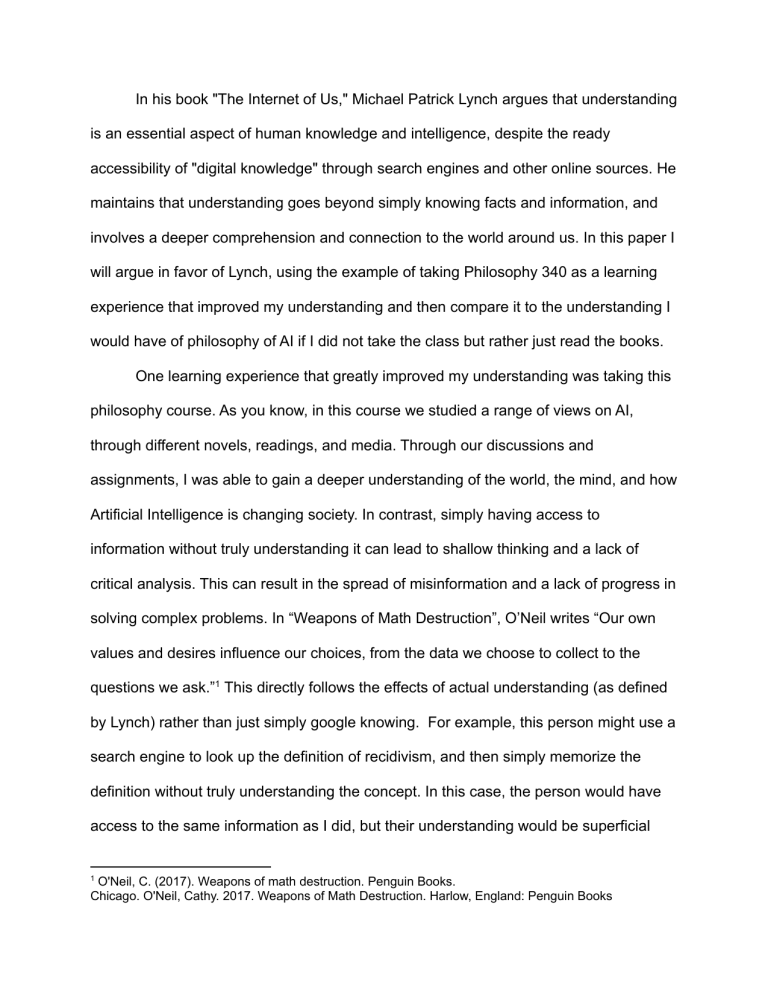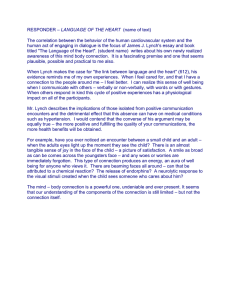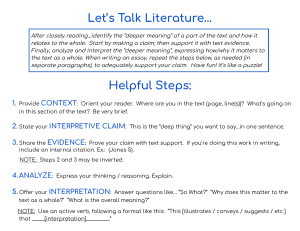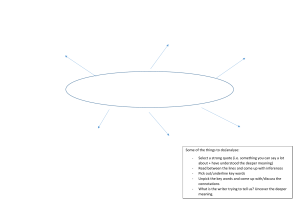
In his book "The Internet of Us," Michael Patrick Lynch argues that understanding is an essential aspect of human knowledge and intelligence, despite the ready accessibility of "digital knowledge" through search engines and other online sources. He maintains that understanding goes beyond simply knowing facts and information, and involves a deeper comprehension and connection to the world around us. In this paper I will argue in favor of Lynch, using the example of taking Philosophy 340 as a learning experience that improved my understanding and then compare it to the understanding I would have of philosophy of AI if I did not take the class but rather just read the books. One learning experience that greatly improved my understanding was taking this philosophy course. As you know, in this course we studied a range of views on AI, through different novels, readings, and media. Through our discussions and assignments, I was able to gain a deeper understanding of the world, the mind, and how Artificial Intelligence is changing society. In contrast, simply having access to information without truly understanding it can lead to shallow thinking and a lack of critical analysis. This can result in the spread of misinformation and a lack of progress in solving complex problems. In “Weapons of Math Destruction”, O’Neil writes “Our own values and desires influence our choices, from the data we choose to collect to the questions we ask.”1 This directly follows the effects of actual understanding (as defined by Lynch) rather than just simply google knowing. For example, this person might use a search engine to look up the definition of recidivism, and then simply memorize the definition without truly understanding the concept. In this case, the person would have access to the same information as I did, but their understanding would be superficial 1 O'Neil, C. (2017). Weapons of math destruction. Penguin Books. Chicago. O'Neil, Cathy. 2017. Weapons of Math Destruction. Harlow, England: Penguin Books and limited. In class, when we discussed course concepts in discussion and lecture, my learning developed into a deeper level of comprehension and connection to the material. In addition to a deeper level of comprehension, I was able to discuss views on course material with other peers as well as the professor, who has had years of experience and also discussed course material with tons of other professionals in the field. This deeper level of understanding allows me to apply the knowledge to other situations and contexts, and to think more critically and creatively about the world around me. In "The Internet of Us," Lynch writes, "Understanding is the ability to see connections, to put things in context, to make judgments about what is true and what is false, and to use our knowledge to engage with the world in a meaningful way."2 I believe that this quote perfectly sums up the value of understanding. It allows us to make sense of the vast amount of information available to us, and to use that knowledge to make informed decisions and contribute to society in a meaningful way. Furthermore, my learning experience involved engaging with the material through discussions and assignments, which allowed me to gain a richer and more nuanced understanding of the concepts. In contrast, the hypothetical case involving "Google-knowing" does not involve any kind of engagement or interaction with the material, and therefore the person's understanding remains static and unchanging. Overall, the differences between my actual learning experience and the hypothetical case provide strong reasons to think that understanding is important. By engaging with the material in a deeper and more meaningful way, I was able to gain a richer and more 2 O'Neil, C. (2017). Weapons of math destruction. Penguin Books. Chicago. O'Neil, Cathy. 2017. Weapons of Math Destruction. Harlow, England: Penguin Books nuanced understanding of the concepts, and to develop critical thinking skills that have helped me in other areas of my life. In contrast, the hypothetical case involving "Google-knowing" does not involve any kind of engagement or critical thinking, and therefore the person's understanding remains superficial and limited. In conclusion, Michael Patrick Lynch is right to emphasize the importance of understanding, despite the ready accessibility of "digital knowledge" through search engines and other online sources. Understanding involves a deeper level of comprehension and connection to the topic, rather than simply “google-knowing”. I argued in favor of Lynch, using the example of taking Philosophy 340 as a learning experience that improved my understanding and then compare it to the understanding I would have of philosophy of AI if I did not take the class but rather just read the books.



